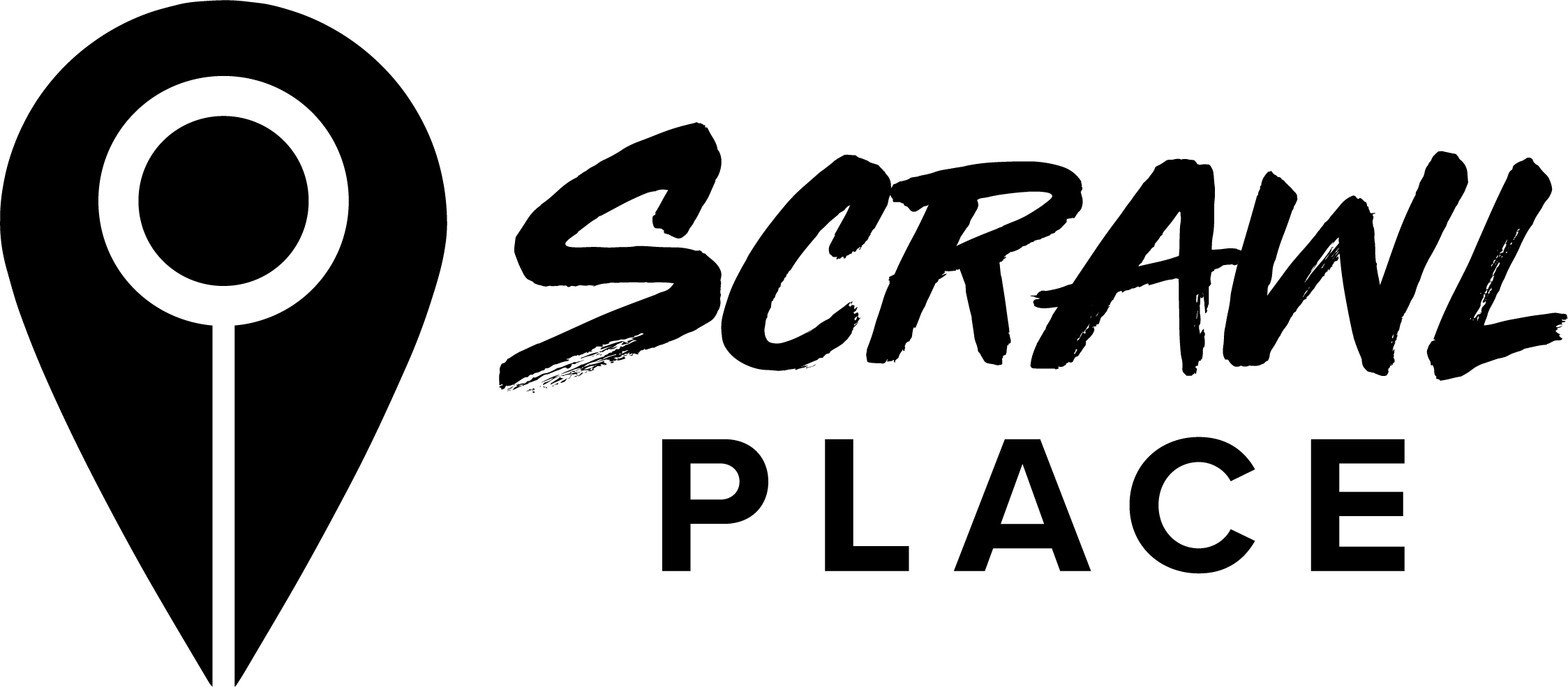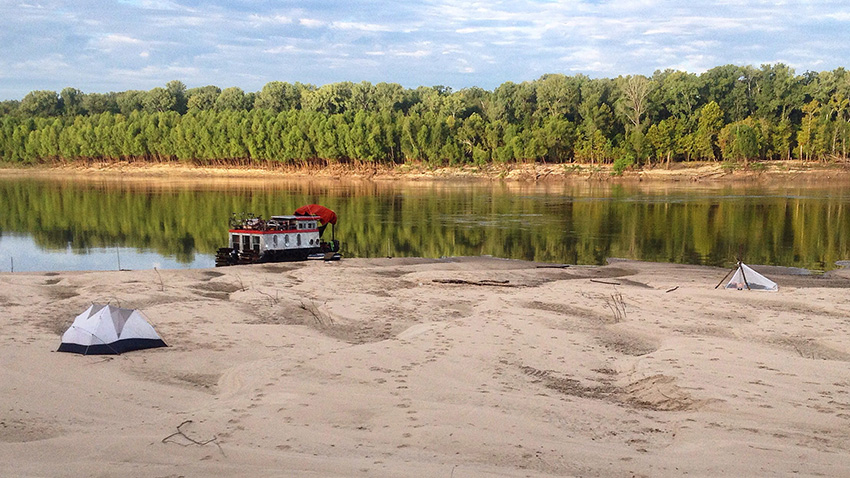Photo by Brian Benson
About a decade ago, when I was as directionless and angsty and heartbroken as I’ve ever been, I went on a boat ride with two of my best friends, Galen and Reid. I call it a “boat ride” because if I say it was a trip down the Mississippi, you’ll want to know if we did the whole thing (yes), and what kind of boat we were on (a thirty-foot paddlewheeler called “The Channel Princess”) and if it was just the most sweet, relaxing thing (it wasn’t, not at all, because we’d decided that, rather than just float down the Mississippi, we would while floating down the Mississippi meet dozens of musicians and record them on the boat’s bow and incorporate their songs and stories into the weekly, serialized radio story we’d write, record, and produce on the river, and this story, loosely based on our travels, would be set in a bizarro post-apocalyptic universe—a “scorched American heartland,” per the press release—in which quirky survivors huddle on riverbanks and communicate via a mysterious river-based radio station that’s under constant threat from a radio eating electrical storm that we—or at least I—hoped would be understood by our legions of adoring listeners as a poignant metaphor for late-stage capitalism), and by the time I’m done talking about that, you’ll be as confused as we were out there.
So, like I was saying: I went on a boat ride with two of my closest friends.
For over three months, the three of us lived together in a space the size of a college dorm room. Reid slept on a slat bed that rolled out above the captain’s chair. I slept on a bed that folded down over the compost toilet. We took turns cooking breakfast and steering the boat and biking back roads to tiny towns to get gas and get rid of trash and we got pretty good at docking and tying bowline knots and setting anchor in Mississippi mud and we ate lots of Saltines and drank lots of whiskey and swam every day and murdered mosquitoes every night and we recorded scores of insanely talented musicians in quiet coves and cacophonous river locks and we met hundreds of people who wanted to know if the boat was steel (it was aluminum) and if the paddlewheels worked (they didn’t) and if we were just partying all day and night (we weren’t) and while doing all of these things and so much more we did manage to write, record, and produce sixteen episodes of a very bizarre radio show that, though probably only a handful of people ever heard it, is probably the art I’m proudest to have made.
That boat trip was the most thrilling thing I’d ever done.
It was also very, very fraught.
We all had different ideas about how the show should sound and feel, and Galen and I had spent more time designing it on the front end, and so Reid often felt left out. Reid was always carving driftwood spoons and tracking sawdust into the cabin and letting the screen door bang shut while I was trying to write. Galen was sometimes pretty rigid about his ideas being the right ones, and so was I, and so was Reid, and sometimes those two wanted to stay up till midnight playing Ricochet Robots when I just wanted to fucking sleep. It was always hot and we never knew where we were going to tie up for the night and Reid almost drowned once and mosquitoes hatched in the boat’s bilge twice and I had to go to the emergency room five times and one afternoon while he was fishing Reid accidentally caught a turtle and that made him very sad and one night Galen hooked up with a beautiful musician on an abandoned tugboat and I didn’t hook up with anybody and that made me very sad and one morning while we were docking I gave Reid an unsolicited suggestion of some sort and Reid, whose father had died a decade earlier, dropped the line on the dock and glared at me and said, “Don’t father-figure me.”
Every Sunday, no matter where we were or what else was happening, we made sure to make time to sit down together, listen to the episode we’d made that week, and talk about our feelings. We all always had a lot of feelings, about all of the above and so much more. We felt silenced. We felt underappreciated. We felt like the show was going in the wrong direction. We felt like we were spending an awful lot of money on peanut butter. We felt like it was someone else’s turn to clean the pee jar. We didn’t like how decisions were being made around here. We didn’t understand why some of us were so angry about Ricochet Robots. We wanted more responsibility on the show. We wanted less responsibility on the show. We wanted everyone to take a little more responsibility for their behavior. We wished the door-banging would stop. We loved each other. We really did.
We were proud of ourselves for having these conversations, for communicating. We felt we communicated better than men usually did, and while this was probably true, that’s a pretty low bar. And so we didn’t, or at least I didn’t, resolve everything in those meetings. Not at all. Not even close. I was often annoyed at Reid for this thing and resentful of Galen for that thing and ashamed of myself for too many things to even begin to list and also I was just an introvert who was spending all day every day working and playing and living with two other tall hairy men in a boat the size of a dorm room. And so I put up walls, more and more every day, only some of which I was aware of.
In Arkansas, we came into possession of a bag of mushrooms. I had never eaten mushrooms before, but I wanted to. Reid and Galen both had eaten them, several times, and they were very excited to do so again, but also more than a little worried about me, given my off-the-charts anxiety. They didn’t tell me this, though. They just told me that they wanted to have this experience with me, and that we should plan to finish our work early one day and find a safe, quiet space and trip together.
Galen motored around the back side of a lush island with a giant sandbar. It felt like the river equivalent of a padded cell: no people, no wind, no current. We ate the mushrooms, and we played some music, splashed around, used the dinghy as a basketball hoop. When we started coming up, we wandered into the woods together. We marveled over spider webs. We gaped up at seed pods that suddenly looked like disco balls. We sat in mud. We stripped naked and lathered ourselves in mud. We crawled out of the woods, onto the beach, and we rolled around until we were coated in sand, like cinnamon toast. Finally, we crawled into the water. When I stood up, the layers of mud and sand began to fall away, like hunks of ice calving off a glacier. I felt like more than mud was calving off me. Like I’d been wearing invisible armor, installed behind fortress walls. I told Galen and Reid that I loved them, and they told me, too, and then, as I began to come down, I sat naked in the shallows, and I stared up at the pastel clouds feathering their way across the sky. The sky was undulating. It looked like a wishing well. When I dropped my wishes into it, those pastel clouds rippled, then calmed.
The next day, we were all so sweet and gentle with each other. Topping off coffee mugs. Exchanging knowing smiles. Softly shutting the screen door. I felt feather-light and wide open. I couldn’t believe I’d spent so many years not feeling this way, living this way. I hadn’t known how many walls I’d put up. I hadn’t known how it could feel to live without them. I hadn’t known.
That afternoon, when we swam, we were naked, as usual. This time, though, when Galen got back in the boat, he didn’t put his clothes on. Neither did Reid, so neither did I. We didn’t talk about it. We just set about doing what we’d normally do—writing, cooking, piloting the boat, playing the guitar—except that now we were naked. It felt a little forced and silly at first, but then it became kind of normal, and then I kind of just stopped noticing it at all. I just felt happy. Happy to feel this way with these men, happy to know that this was how it would be, on this boat, in our friendship, from now on.
I don’t remember who put his pants back on first.
I don’t remember taking mine off again, either.
Brian Benson is the author of GOING SOMEWHERE and co-author, with Richard Brown, of THIS IS NOT FOR YOU. Originally from the hinterlands of Wisconsin, Brian now lives in Portland, Oregon, where he teaches at the Attic Institute. His essays have been published or are forthcoming in Sweet, Hippocampus, Bending Genres, Hunger Mountain, and Short Reads, among several other journals.

